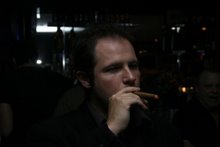I probably spend too much time nitpicking the technical details of the movies that I see. It's an occupational hazard. Once you've spent a few hundred days on movie sets, you get an eye for continuity errors, boom shadows, and those scenes that have too few camera angles that reek of a producer saying "I can't afford the overtime."
Generally, I just make a mental note and then tell myself to get over it. Movies aren't made for movie-makers, after all.
One thing, however, has been really bugging me lately. I've seen it over and over again and it really sticks in my craw.
Several films* that I've seen lately have had serious focus issues. Characters in close up drift in an out of focus. When the shot moves the focal point lags behind the action. Justified changes in light alter the depth of field in the middle of a scene and the focus is not adjusted accordingly. Occasionally, whole scenes go by without a single sharp frame.
Now, I'm not going to lay this all at the feet of 1st AC's. Pulling focus is a precise art that can take years to master. In my experience, the combination of judging distance, anticipating actors and simultaneously watching focus wheel, floor marks, talent and monitor is no small task and is very difficult to teach.
On the other hand, really?
Between the AC who pulls focus, the DP that monitors it, the director who chooses the takes, the editor who assembles them and the producer who gets final say, nobody stopped and said, "hey, that's a little blurry,"?
There are a number of reasons that this has been getting worse in recent years. A number of studio directors have been favoring forehead-to-chin closeups in combination with long lenses and low light. This makes the depth of field very narrow and gives the focus puller very little breathing room, especially when dealing with actors that tend to the frenetic.
For decades the artistic tendency of the industry has been shifting steadily away from the deep focus and more towards the use of the lens, itself, as a narrative tool, throwing focus between multiple planes to communicate a visual idea.
Additionally, the tools of the industry have changed in the last five years. Newer, digital capture cameras do not have exactly the same optical properties as older, celluloid based, models. More and more hi-tech tools such as laser and sonic range finders and remote follow-focus handsets may have caused some camera people to trust their tools over their own experience. Steadicam, probably the hardest platform from an AC's perspective, is rapidly replacing the dolly as the standard way to mount and move a camera.
On top of all of this, movie screens are getting larger, making soft images much more obviously so.
Honestly, I'm bothered by more than just soft pictures. This inconsistency in focus is syptomatic of a larger and longer trend in the industry away from technical excellence. "We'll fix it in post," was once a vulgar expression, a cop out made when the company was behind schedule or the producer was bored. We've now reached such virtuosity with the digital manipulation of images that virtually any imperfection can, in fact, be fixed in post, often for less than the cost of another handful of takes.
Unfortunately this lets technicians, myself included, get lazy. Eventually, we get to the point that we feel anything can be fixed by a guy with the right software; this is not the case and it's beginning to show.
*No, I'm not going to name these films. That would be rude to my friends and colleagues that worked on those shows.
Subscribe to:
Post Comments (Atom)


1 comment:
As a guy who makes his living in Post, I wish more people shared your sentiment. So often I see work come through that if handled correctly on set would allow the VFX artists to spend more time making their own contributions look great rather than compensating for earlier mistakes. Though there's little we can do about bad focus, I can't tell you how many times I've seen a ton of potential artistry lost to technical things like tracking and roto which had the on set crew been a little more diligent would have been a breeze.
Post a Comment